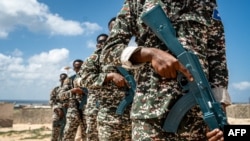Since its emergence in 2006 from a 15-year civil war, Somalia has been working toward unifying the country and eventually seating a legitimate government, elected by the Somali people, which will bring stability and peace to a land splintered and torn by war for generations.
But reaching this goal was made doubly difficult due to the Al-Shabab terrorist group, which imposed its control on much of Somalia, including the capital, Mogadishu.
In 2006 the African Union sent help via the African Union Mission in Somalia, or AMISOM, whose primary objective was to maintain the newly installed Transitional Federal Government and implement a national security plan. Sixteen years later, AMISOM was replaced by the African Union Transition Mission in Somalia, or ATMIS, which is focused on both military and institutional autonomy of the Somali government.
That mission is now nearing its end. In mid-August, the UN Security Council voted to authorize the African Union extend its peacekeeping operation in Somalia to the end of the year, then draw down, to be replaced by another mission. This is a key step toward the Somalia’s takeover of its own security.
“The United States is pleased to vote in favor of extending the ATMIS UN source mandate,” said U.S. Political Minister Counselor to the UN, John Kelley. “Above all, we recognize and honor the sacrifices by Atmos and Somali security forces in pursuit of peace and security in Somalia.”
“We applaud Somalia's continued commitment to the fight against al-Shabab. We fully support Somalia's goal of assuming greater responsibility for its own security as soon as possible and recognize ATMIS and an anticipated UN Security Council mandated, EU led, follow on peace support operation have vital roles in supporting that goal,” he said.
“The mission to protect vital strategic locations and critical infrastructure is critical in completing detailed planning on scope, tasks and financing for the mission is urgent,” said Ambassador Kelley.
“The United States reaffirms support for ATMIS and its anticipated follow UN mission as vitally important to the stability of Somalia and the region. We acknowledge a challenging road ahead, especially when it comes to financial support for the successor mission.”
“ATMIS will continue reducing the threat posed by al-Shabab,” said Ambassador Kelley, “and continue supporting the development of an integrated Somali security force capable of assuming progressively greater security responsibilities.”






